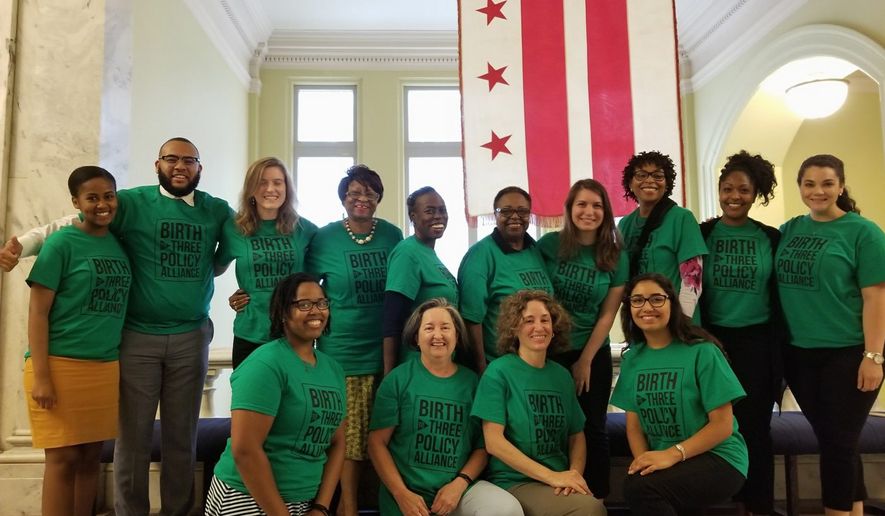The District wants to be a leader in yet another early childhood education model, but a lack of funding could leave the new program in limbo.
On Tuesday afternoon, the D.C. Council approved legislation to fund more childcare centers for infants and toddlers, as well as improve maternal health care services. Supporters in the hallway outside the chamber cheered so loud security had to quiet them, but steep fundraising needs means the bill isn’t out of the water just yet.
At-large Councilmember Robert White, a Democrat, said the inspiration for the legislation his young daughter Madison.
“As a father, I learned firsthand how expensive and difficult it is to find high-quality early education programs,” he said.
The bill, dubbed the “Birth-to-Three for All DC Act of 2018,” aims to fund pre- and post-natal services such as lactation consultants, pregnancy checkups and home visits for new moms, as well as to establish pay scales and training opportunities for childcare workers.
The bill also calls for better tracking of the health of young children with disabilities who may require what experts call “early intervention” to build skills during a crucial period of brain development.
The council unanimously voted in favor of the legislation, with newly re-elected Ward 6 Councilmember Charles Allen, a Democrat, saying he hoped it could reduce the District’s expensive childcare bills — which average $22,658 a year — and narrow the city’s long standing achievement gap between the rich and poor students.
“You can’t just rely only on this piece, but it’s a key piece,” said bill supporter Judy Berman, deputy director of the D.C. Appleseed Center for Law and Justice, a child education think tank.
Another piece is the free pre-kindergarten legislation the D.C. Council passed in 2008. Since then, advocates have targeted the low wages that cause high turnover in the city’s childcare facilities. Studies from 2016 and 2012 indicate the national average wage for childcare workers is $10 an hour, and turnover rates are about 30 percent — both factors they say can harm children’s learning progress.
“This has taken a decade,” said bill supporter Barbara Kamara, a retired assistant superintendent for early childhood learning at D.C. Office of the State Superintendent of Education, calling it a “historic” bill.
Ms. Kamara stood with 14 women, and 1 man, in green T-shirts that read “Birth to Three Policy Alliance” as they waited in the hallway for the voting results. The Alliance is a collection of 20 education advocacy organizations and think tanks brought together by the Bethesda-based Bainum Family Foundation, which pledged $10 million toward early childhood initiatives in the city in 2016.
Ward 7 Councilmember and former Mayor Vincent Gray said the new investment could make the District the “unquestioned leader in the world in high quality birth-to-three services.”
The only problem? The money isn’t quite in the bag yet.
The council expected the bill to pass and already allocated $1,610,749 for the programs in the next year’s budget, split between a pediatric primary-care program ($300,000), the home visiting program ($710,566), a pilot program for community resources ($500,000), and a study on childcare pay scales ($100,183). However, that falls far short of the $200 million tab estimated to fully fund the initiatives over the next four years.
Council Chairman Phil Mendelson, a Democrat, said in an interview that the cost of the bill fell “well beyond our ability to meet other needs” in the city and that fundraising would pose a challenge. “Bake sales aren’t going to cut it,” he said.
Despite this, member of the Birth to Three Policy Alliance were optimistic on their way to a happy hour to celebrate the legislative win.
“It’s not rocket science,” quipped Ms. Berman from D.C. Appleseed. “We did it for the free pre-K program,” Ms. Berman said she and the others will work to identify a mix of local, federal and private funding to cover costs and help implement the program in phases in the meantime.
Tuesday was the D.C. Council’s second-to-last legislative session before the Wilson Building recesses for the summer, and spirits were high and restless in the four-hour-long meeting. The council is set to reconvene on July 10th to vote on the dozen or so remaining bills.
• Julia Airey can be reached at jairey@washingtontimes.com.




Please read our comment policy before commenting.